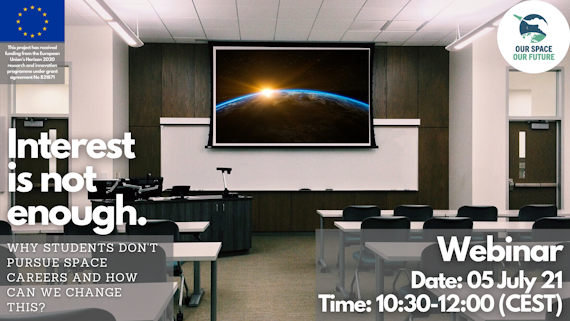Interest is Not Enough
This event has ended.
Contact
Add to calendar

The aim of Our Space Our Future is to inspire the next generation to take their first steps into a career in the space sector. By providing opportunities for school pupils across Europe to interact with the topic in an engaging and inclusive way and communicate that a career in this field is not unobtainable. There is space for everyone! Through the development of activities, tools, and teaching approaches to help teachers and their students reach the stars together.
As part of the Our Space Our Future project, a series of surveys has been conducted on school students from across Europe. The data from these surveys have shown that whilst school-aged pupils are very interested in topics related to space – the majority do not consider it a viable career option and would not pursue studying the subject any further. Why does a passion for learning about space not equate to people entering the field? Where are we falling down when we talk about space? Join us on the 5th of July at 10:30 CEST for Interest is not Enough.
Objectives
To discuss the current roadblocks that potentially put off students from studying STEM subjects and to continue pursuing a career in the space sector.
To address how STEM is taught in schools and the need to incorporate aspects of space sector research and work into different subjects in the school curriculum.
To highlight the need to change the narrative around the people who work within the space sector, and the need to promote alternative career pathways that are available.
Speakers
1. Ms Shaaron Leverment– Explorer Dome and Our Space Our Future: Discussing the findings for the Our Space Our Future student survey and literature review
2. Ms Samantha Borley-Institute of Physics: What are the current roadblocks that turn off students from studying physics (particularly in the space sector). Are there groups of students that we need to focus our attention on when we try to talk about space science in the classroom? How can we address these issues?
3. Ms Clara Cruz Niggebrugge-European Space Education Resource Office: Will talk about primary and secondary school initiatives that the ESERO project has used to connect pupils with people working within industry and academia through online sessions and how to incorporate aspects of space sector research and work into different subjects in the school curriculum and expand the reach and career outlook by taking a multidisciplinary approach.
4. Prof. Chris Welch– International Space University: Addressing the role that higher education and research institutes play in encouraging young pupils into the field as well as discussing alternative ways to get into the space sector (internships etc) and the advantages of having people with alternative backgrounds entering the space sectors and how we might promote these alternatives.